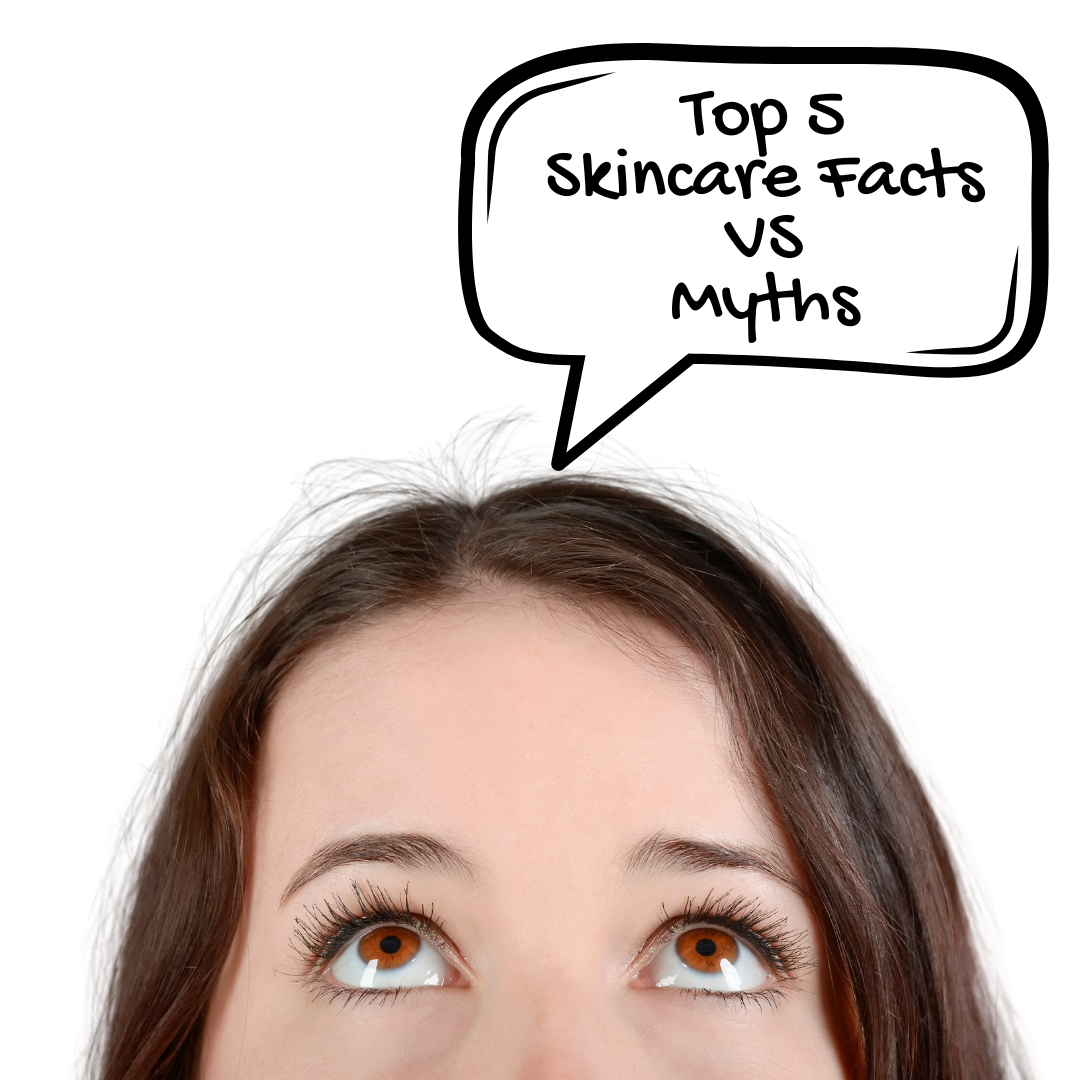
Top 5 Skincare Myths You Need to Stop Believing Now: Experts Weigh In!
5 Common Skincare Myths Debunked: Expert Insights for Healthy, Glowing Skin
Skincare can be confusing, with countless products, techniques, and ingredients claiming to be the "holy grail" for flawless skin. Amid all this information, myths and misconceptions about skincare often arise. These myths can mislead even the most diligent skincare enthusiasts, leaving many with questions about how to properly care for their skin.
In this blog post, we'll take a closer look at five of the most common skincare myths and set the record straight with expert-backed, scientifically-supported facts. By the end of this post, you'll have a better understanding of how to adjust your skincare routine for healthier, clearer, and more glowing skin.
Myth 1: "Pores Open and Close"
One of the most widespread myths in skincare is the belief that pores can open and close. It's a common claim, often mentioned in beauty magazines and advertisements promoting products that "open" pores for a deep cleanse or "close" pores to prevent dirt from entering. But what do the experts say?
The Truth About Pores
The fact is, pores do not have muscles, which means they cannot open or close like a door. Pores are small openings in the skin where hair follicles reside and where oil and sweat are released. While it's true that pores can appear more or less visible, they don’t actually change size or "open" and "close."
When you use steam or hot water on your face, you might feel like your pores are opening. However, what is happening is that the heat is softening the debris (oil, dirt, dead skin cells) inside your pores, making it easier to remove during cleansing. Similarly, when you splash your face with cold water, it might give the temporary sensation of "tightened" skin, but it's not actually closing the pores. Instead, the cool water causes blood vessels to constrict, which reduces inflammation and makes pores less visible for a short time.
How to Minimize the Appearance of Pores
While you can’t "open" or "close" your pores, there are steps you can take to reduce their appearance:
- Exfoliation: Using gentle exfoliants like salicylic acid can clear out the debris that makes pores look larger.
- Retinoids: Over time, retinoids help increase skin cell turnover and can reduce the look of enlarged pores.
- Oil Control: Controlling excess oil with products like niacinamide can also make pores appear smaller.
Myth 2: "Natural Ingredients Aren’t as Strong or Effective as Synthetic Ones"
There is a common assumption that natural ingredients are less potent or effective compared to their synthetic counterparts. In an industry flooded with "all-natural" marketing, people often believe that synthetic ingredients are necessary for powerful results. But how do dermatologists and skincare experts weigh in?
The Truth About Natural vs. Synthetic Ingredients
Natural ingredients can be just as powerful, and in some cases, even more effective than synthetic ones. In fact, many of the most commonly used skincare ingredients, like hyaluronic acid, salicylic acid, and retinoids, originate from nature.
For example, bakuchiol, a natural alternative to retinol, has been shown to provide similar anti-aging and skin-brightening benefits as retinol, without the irritation and redness that some people experience with synthetic retinoids. Similarly, aloe vera, green tea extract, and chamomile are all natural ingredients that offer significant soothing and healing benefits.
When Are Synthetic Ingredients Necessary?
In some cases, synthetic ingredients are formulated to be more stable or to penetrate the skin more effectively. For example, vitamin C can degrade quickly in its natural form, so synthetic derivatives like ascorbyl palmitate are created to offer longer shelf life and more stability in skincare formulations.
Key Takeaway: Both natural and synthetic ingredients have their place in skincare. The effectiveness of a product depends on the formulation, concentration, and compatibility with your skin, not simply whether it's natural or synthetic.
Myth 3: "You Don’t Need Sunscreen on Cloudy Days"
This is one of the most harmful skincare myths out there: you only need sunscreen when it's sunny. Many people skip SPF when the weather is overcast, assuming that their skin is safe from UV damage.
The Reality: UV Rays Penetrate Through Clouds
Even on a cloudy or rainy day, up to 80% of UV rays can penetrate the clouds and reach your skin. These rays are responsible for both sunburns and long-term damage like premature aging, dark spots, and an increased risk of skin cancer. There are two types of UV rays that affect the skin:
- UVA rays: These penetrate deeper into the skin and contribute to aging and skin damage.
- UVB rays: These are responsible for sunburn and play a role in the development of skin cancer.
While you may not feel the effects of the sun on a cloudy day, UVA rays are still active and can cause significant harm over time. That’s why experts recommend wearing broad-spectrum sunscreen with at least SPF 30 every day, rain or shine, indoors or outdoors.
Tips for Sunscreen Application:
- Apply sunscreen generously to all exposed skin, including the face, neck, and hands.
- Reapply every two hours, especially if you're spending time outside.
- If you're inside near windows, you still need sunscreen, as UVA rays can penetrate glass.
Myth 4: "Scrub Harder for Clearer Skin"
Many people believe that scrubbing the skin harder or using abrasive exfoliants will lead to clearer, smoother skin. While exfoliation is an important part of a skincare routine, this myth can do more harm than good.
The Truth About Exfoliation
Over-exfoliating or using harsh, gritty scrubs can actually damage the skin barrier, leading to increased irritation, redness, dryness, and even breakouts. Your skin's natural barrier is designed to protect against environmental damage, and aggressive scrubbing can strip away the protective oils and disrupt the balance of bacteria on the skin, causing more harm than good.
The Right Way to Exfoliate:
- Gentle is Key: Use a chemical exfoliant like AHAs (glycolic acid, lactic acid) or BHAs (salicylic acid) for a more controlled and gentle exfoliation. These acids break down dead skin cells without the need for scrubbing.
- Frequency: For most skin types, exfoliating 2-3 times a week is sufficient. Over-exfoliating can lead to increased sensitivity and breakouts.
- Clear 6 Serum is an ideal daily exfoliant because it is non irritating while boosting cellular turnover and clearing pores!
Dermatologists recommend listening to your skin: if it feels sensitive or irritated after exfoliation, give it time to recover. Scrubbing harder won’t lead to clearer skin—in fact, it may lead to more skin problems.
Myth 5: "Benzoyl Peroxide is Helpful for All Types of Blemishes"
Benzoyl peroxide is a popular and widely-used acne treatment, but there’s a common misconception that benzoyl peroxide works for all types of acne. Many believe it is a cure-all solution for every breakout, but this isn't always the case.
The Science Behind Benzoyl Peroxide
Benzoyl peroxide is highly effective at treating inflammatory acne, which includes red pimples and pustules. It works by killing acne-causing bacteria (P. acnes) on the skin and reducing inflammation. However, it is less effective for treating non-inflammatory acne, like blackheads and whiteheads, which are caused by clogged pores and not necessarily bacteria.
Additionally, benzoyl peroxide can cause dryness, irritation, and peeling, especially for people with sensitive skin. It’s also known to bleach fabrics and towels, which can be inconvenient.
When to Use Benzoyl Peroxide:
- Best for treating inflamed pimples and pustules.
- Not ideal for blackheads, whiteheads, or cystic acne.
- If you have sensitive skin, look for products with lower concentrations (2.5% to 5%) to minimize irritation.
If you have non-inflammatory acne or more severe types of acne like cystic acne, consider alternatives like salicylic acid, retinoids, or consulting a dermatologist for a tailored treatment plan.
Conclusion: Debunking Skincare Myths for Healthier Skin
It's easy to get caught up in skincare myths, especially with so much conflicting information available. However, with guidance from experts and scientifically-backed information, you can make informed decisions for your skin. Remember:
- Pores don’t open or close, but they can appear smaller with proper care.
- Natural ingredients can be just as effective as synthetic ones.
- Sunscreen is essential every day, even when it’s cloudy.
- Gentle exfoliation is better than scrubbing too hard.
- Benzoyl peroxide is a powerful tool for certain types of acne, but it’s not a one-size-fits-all solution.
By debunking these myths and embracing proven skincare practices, you’ll be on your way to healthier, more radiant skin. If you're unsure about your skincare routine, it’s always a good idea to consult a dermatologist for personalized advice.




Leave a comment
This site is protected by hCaptcha and the hCaptcha Privacy Policy and Terms of Service apply.